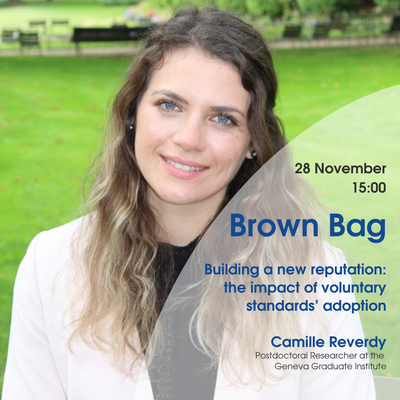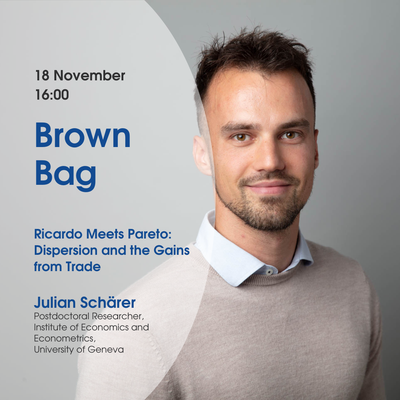28 Nov 2023
Brown Bag Seminar,
15:00 - 17:00,
Anna Nussbaum Auditorium, World Trade Institute,
Hallerstrasse 6, Bern, Switzerland OR Online
Special Economist Brown Bags: Camille Reverdy (Geneva Graduate Institute) and Julian Schärer (University of Geneva)
Join a special edition of the 2023 Brown Bags dedicated to economists. Camille Reverdy, from the Geneva Graduate Institute, will present "Building a new reputation: the impact of voluntary standards’ adoption", followed by Julian Schärer, from the University of Geneva, on "Ricardo Meets Pareto: Dispersion and the Gains from Trade".
15:00 - "Building a new reputation: the impact of voluntary standards’ adoption"
by Camille Reverdy
Postdoctoral Researcher at the Geneva Graduate Institute
Abstract
"Raising environmental awareness has led to the proliferation of environmental standards. They aim at helping the organisation to reduce its environmental impacts and increase its operating efficiency. Using detailed French administrative data, I estimate the effect of voluntary environmental certification on firms’ export performance. I observe that the environmental certification positively impacts the probability to export (extensive margin) and the volume of exports (intensive margin), through an increase of the export price. The probability of export of certified firms increases by 1.4% while the volume of export increases by 10.8% following the
certification thanks to a 2.2% increase of the price and an increase of 9.6% of the exported quantity. However, this effect is heterogeneous across destinations, products and across firms: the quantity, exported to destinations with higher environmental
awareness, increases."
Camille's Biography
Camille is a post-doctoral researcher at the Geneva Graduate Institute, under the supervision of Richard Baldwin and Marcelo Olarreaga. She holds a PhD in international economics from the University of Paris 1 Panthéon-Sorbonne and was a Marie Curie Early-Stage Researcher in the framework of the Horizon 2020 Marie Curie network on European Union Trade and Investment Perspectives. Her thesis is entitled « Essays on Regulatory Measures in International Trade » and was supervised by Lionel Fontagné and Gianluca Orefice.
Before joining the University of Paris 1, Camille interned at the International Trade Centre (ITC) in Geneva, working on the non-tariff measures impeding trade in developing countries and as an international consultant in market research in ITC, developing a method assessing export potential value for trade in services.
She also works as an international consultant for the World Bank on a project assessing the impact of import ban in Sri Lanka, with Ana Fernandes and Devaki Ghose.
16:00 - "Ricardo Meets Pareto: Dispersion and the Gains from Trade"
by Julian Schärer
Postdoctoral Researcher at the Institute of Economics and Econometrics at the University of Geneva
Abstract
Dispersion governs Ricardian comparative advantage, which in turn shapes trade patterns. It is uncontested that a general increase in dispersion results in greater gains from trade. But what are the sources of these gains? Do countries primarily benefit from their own dispersion, or are the benefits of dispersion shared globally? To address such fundamental questions, I provide the first tractable Ricardian theory that accommodates country-specific dispersion parameters. In an environment \`a la Eaton and Kortum (2002), I show that Pareto-distributed cost draws allow for country-specific scale and dispersion parameters.
The model can readily be characterized and calibrated to the data. I consider counterfactual exercises where I increase dispersion parameters both unilaterally and uniformly, and my quantitative results suggest that trading partners would contribute to between one-third and one-half of the potential welfare gains from additional dispersion. Unlike in gravity models, trade flows do not need to obey the independence of irrelevant alternatives (IIA) property, and I indeed find asymmetrical effects of a small China shock on other countries. Moreover, increased dispersion implies higher gains from trade than what the canonical formula by Arkolakis et al. (2012) can account for. Finally, my model can explain trade zeros with Ricardian forces.
Julian's Biography
Julian Schärer is a Postdoctoral Researcher at the Institute of Economics and Econometrics at the University of Geneva. He completed his PhD at the University of Zurich in 2023 and works on topics in international trade, economic growth, and market power. Julian was recently awarded a Junior Fellowship in International Trade (JFIT) at LMU Munich and previously spent the academic year 2021-22 at the MIT Economics Department.
Register to attend online at https://us06web.zoom.us/meeting/register/tZAkdO6prTksG92COhH_2x0YTsmshJoDsjD2
Further info
Register to participate via zoom
Camille Reverdy on LinkedIn
Camille Reverdy on Twitter
Julian Schärer on LinkedIn
Julian Schärer on Twitter
Julian Schärer's personal website



